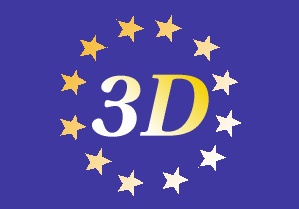Post-doctoral positions in
the EC Research Training Network

Euro3D
"Promoting 3D Spectroscopy
in Europe"
Note: all posts have been filled (16-Jun-2003).
A group of 11 European institutes with experience in 3D
spectroscopy has formed a European Commission Research Training Network
to promote the scientific access to imaging spectroscopy. The participating
institutes are:
-
Astrophysikalisches
Institut Potsdam, Germany, * Network Coordinator (contact: Martin
Roth mmroth@aip.de)
- this post has been filled
-
Institute
of Astronomy, Cambridge, UK (contact: Richard McMahon rgm@ast.cam.ac.uk)
- this post has been filled
-
University
of Durham, UK (contact: Jeremy Allington-Smith j.r.allington-smith@durham.ac.uk)
- this post has been filled
-
European
Southern Observatory, Garching, Germany (contact: Jeremy Walsh
jwalsh@eso.org)
-
Max-Planck
Institut fuer Extraterrestische Physik, Garching, Germany (contact:
Niranjan Thatte thatte@mpe.mpg.de)
- this post has been filled
-
Leiden
Observatory, The Netherlands (contact: Paul van der Werf pvdwerf@strw.leidenuniv.nl)
- this post has been filled
-
CRAL
Observatoire de Lyon, France
(contact: Peirre Ferruit pierre@obs.univ-lyon1.fr)
- this post has been filled
-
Laboratoire
d'Astrophysique de Marseille, France (contact: Vincent le Brun
vlebrun@astrsp-mrs.fr)
- this post has been filled
-
Instituto
di Fisica Cosmica e Technologie Relative, Milan, Italy (contact: Bianca
Garilli bianca@ifctr.mi.cnr.it)
- this post has been filled
-
Observatoire
de Paris, Meudon, France(contact: Veronique Cayatte veronique.cayatte@obspm.fr)
- this post has been filled
-
Instituto
de Astrofisica de Canarias, Teneriffe, Spain (contact: Evencio
Mediavilla emg@ll.iac.es)
- this post has been filled
The aim of the network is to facilitate the exploitation
of astronomical 3D spectroscopy data (i.e. simultaneous spectroscopy of
a two-dimensional area of the sky). 3D datasets are large and experience
in analysing the data is largely confined to the expert groups. The young
researchers in the network will apply 3D spectroscopy to forefront astronomical
problems in the following typical areas: pre-main sequence objects; resolved
stellar populations; normal and active galaxies; groups and clusters of
galaxies; high redshift galaxies and gravitational lenses. The candidates
will actively participate in the development of common-user tools for extracting
scrintific results from 3D astronomical data. Members of the network have
access to a wide range of 3D observing facilities, currently existing,
soon to be commissioned and under development: Oasis, Integral, Sauron,
GMOS, UIST, PMAS, VIMOS, FLAMES, CIRPASS, SINFONI and TEIFU.
A total of 10 two-year
postdoctoral positions will be available in the Euro3D
network from autumn 2002 in all the above listed institutes except the
European Southern Observatory. According to the rules of the EC RTN programme,
these posts are open to nationals of another European Union country, or
Associated State, other than that in which the post is held. Applicants
must not be older than thirty-five years and must not have carried out their
normal activities in that country for more than 12 of the 24 months prior
to their appointment.
Applications should be sent to: RTN Euro3D, c/o Dr. Martin
Roth, Astrophysikalisches Institut Potsdam, An der Sternwarte 16, D-14482
Potsdam, Germany. Applicants should send a curriculum vitae, publication
list, a summary of current research interests and details of software experience.
A priority order of the institutes at which the applicant would prefer
to work should also be enclosed. The applicant should arrange for three
letters of reference to be forwarded. Applications are open from July 2002.
Letters of interest from researchers who expect to be available within
the next year are welcomed at any time. Applications from women and minorities
are particularly encouraged. Further details of the Euro3D RTN are available
at
http://www.aip.de/Euro3D/ or from
 .
.
Last updated 25-Jul-2005 bom


 .
.